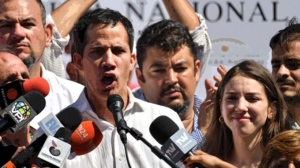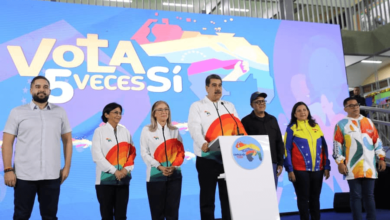
Yet another violent U.S. plot has been thwarted in Venezuela, starting on March 21 with the arrest of Roberto Marrero by Venezuelan authorities. Marrero is “chief of staff” of U.S.-backed imposter Juan Guaidó and was caught in his home with assault rifles, funds and cell phones with incriminating evidence of plans for terrorist attacks.
John Bolton and Mike Pompeo immediately jumped on Marrero’s arrest to issue new threats against President Nicolás Maduro, with Bolton warning, “the arrest will not go unanswered.”
But the Venezuelan government answered first, by revealing to the public the terrorist plans.
According to government investigators, Guaidó and Marrero are principal conspirators of the assaults that were to be carried out by some 60 terrorists recruited from El Salvador, Nicaragua and Guatemala. They have been training in Colombia for armed attacks. There the president Iván Duque is playing an aggressive role in supporting U.S. plans to overthrow President Nicolás Maduro.
Communications and Information Minister Jorge Rodríguez said Saturday on VTV television that 30 of the hired henchmen already infiltrated Venezuelan territory on February 23, the same day the U.S. tried to force so-called “humanitarian aid” into Venezuela through bridge crossings that border Colombia.
Although the two border crossings are now closed between Venezuela and Colombia, thousands of pathways called “trochas” cross between the two countries. Enormous amounts of contraband — gasoline and subsidized Venezuelan products — are passed through and sold in Colombia for profit.
It is through these sieve-like paths that paramilitary operatives and weapons have entered Venezuelan territory.
Rodríguez revealed details of the multi-faceted terrorist operation, mostly drawn from cell phones captured during Marrero’s arrest:
“…We received intelligence messages that unusual activities were being carried out in Guatemala, and Honduras, with the epicenter in El Salvador, where assassins linked to crime, narco-trafficking, the Maras (Salvadoran gangs) and to the Nicaraguan Contras, were hired.
“Remember in the 1980s and 1990s that Elliot Abrams had a very significant role in the Nicaraguan Contra war. He is now assigned to commit aggression against the Venezuelan homeland.”
Of the paramilitaries who infiltrated the country, Rodríguez said, “We are searching for them by land, by sea, by air, wherever they are. We will capture them because we have already identified some of them who entered Venezuelan territory.” Wilfrido Torres Gómez, the head of a Colombian paramilitary gang linked to the plots, Los Rastrojos, was arrested in Carabobo, Venezuela. President Maduro spoke to thousands outside Miraflores about Torres, “We have captured the head of Los Rastrojos … and he is giving information and evidence of who hired him, and why they brought him to Venezuela.”
The plans included assassinations of social and political leaders of the Bolivarian Revolution, with lists of those targeted, new sabotage against the electrical system, the Metro subway, the bombing of cable cars, and finally an assassination attempt on President Maduro.
Guaidó, during a March 22 rally in Anzoátegui state, hinted at a coming attack against Maduro at Miraflores presidential palace: “Venezuelans do not beg for our rights. That is why soon we will go to Miraflores to rescue the office of all the Venezuelans … we have to organize because the dictator will not leave amiably.”
According to texts on confiscated cell phones, Guaidó’s “general staff” and co-conspirators are all from the Popular Will party (Voluntad Popular). They include VP’s leader, Leopoldo López, alias “Gavilán,” currently under house arrest, and Carlos Vecchio, Gauidó’s so-called ambassador to the U.S., who led the illegal March 18 takeover of Venezuelan government properties in Washington, D.C.
The Venezuelan government’s investigation shows that Banesco bank and Bank of America accepted funds intended for Guaidó into NGO accounts created by Colombia’s Duque. The funds that Guaidó and company hoped to have at hand was to be at least $1 billion, wealth stolen from Venezuelan assets.
With this enormous quantity of money, Marrero was able to promise the woman who was helping to contract the mercenaries in Colombia, “Roxana of Cúcuta,” that he would send her $500,000 to $700,000 dollars daily to pay them.
The U.S. reliance on paramilitaries inside Venezuela for internal attacks on leaders and government institutions fits into a likely scenario of indirect U.S. military action at this stage, rather than sending U.S. troops in.
But this latest plot emphasizes the urgent need for the anti-war forces inside the United States to intensify the movement in the streets to demand “Hands Off Venezuela!” Also essential are educational forums, teach-ins and alternative media coverage to break through the flood of Pentagon and corporate media lies.





